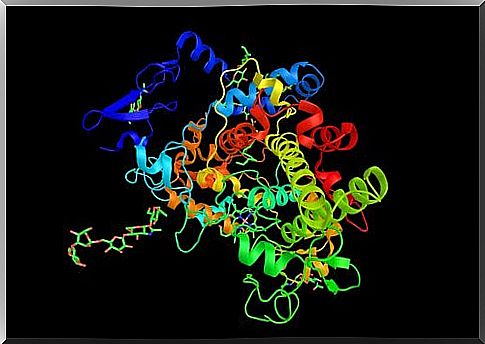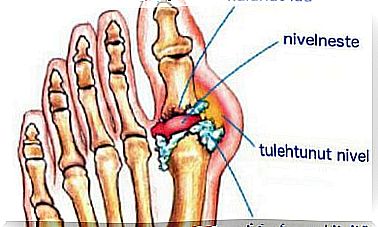What You Need To Know About Ibuprofen

Ibuprofen is a non-steroidal anti-inflammatory drug. It is one of the first options for pain, inflammation and fever.
It is estimated that half of the population suffers from headaches and 30 million people suffer from low back pain.
In addition, some suffer from pain caused by cancer, heart disease and other illnesses. The main treatment for the pain caused by these problems is usually none other than ibuprofen.
What is ibuprofen used for?

Ibuprofen is available as tablets, capsules or syrup. In all these cases, it is a medicine that relieves inflammation and pain and reduces fever.
Its antipyretic effect begins after an hour and lasts for 2-4 hours. Instead, it may take a week of treatment for its anti-inflammatory effects to begin.
The main uses of ibuprofen are as follows:
- Treatment for situations involving pain or inflammation such as headaches, migraines, earaches, menstrual cramps, sore throat and muscle aches.
- Symptoms of fever.
- Diseases such as rheumatoid arthritis and osteoarthritis (joint disease).
- Treatments for soft tissue wounds such as muscle sprains.
How ibuprofen works
Ibuprofen works by blocking prostaglandin synthesis. It blocks the action of a cyclooxygenase enzyme that converts arachidonic acid to prostaglandins.

Structurally, ibuprofen comes from propionic acid. It is a racemic mixture (two compounds that are mirror images of each other). Their activity depends almost entirely on the S-isomer.
Pharmacokinetics: What happens to ibuprofen in the body?
Ibuprofen is a drug that is not very water soluble. However, it is often used in arginate or lysate form to improve its solubility and pharmacokinetic profile. Its main features are:
- Absorption: Oral and parenteral (intravenous) methods are the most common. When taken orally, it is fast and effective.
- Distribution: Ibuprofen is highly bound to plasma proteins (90-99%). It is able to spread throughout tissues.
- Metabolism: Most metabolism occurs in the liver. This occurs through hydroxylation and carboxylation, generating numerous inactive metabolites.
- Excretion: Ibuprofen is excreted mainly in the urine (90%) and a small amount in the faeces. This will happen within 24 hours.
Dosage
The dosage depends on the dosage form to be administered to each patient. Doctors recommend that it be well defined for everyone.
However, it is usually as follows:
- For adults, the dose should be 400-600 mg every 6-8 hours, but not more than 2400 mg per day.
- In children aged 3 months to 11 years, the dose should be 20-30 mg / kg per day in 3 or 4 divided doses.
- This means that the effectiveness and safety of the medicine in children under 3 months of age have not been evaluated.

Doctors recommend the parenteral method only for adults, every 6-8 hours, so that the dose never exceeds 600 mg. However, the medicine should be taken orally whenever possible.
Ibuprofen should be used with caution as overdose may lead to kidney or liver problems.
Barriers to use and precautions related to ibuprofen
There are some precautions you should know about ibuprofen:
- Hypersensitivity to ibuprofen. Hypersensitivity has been reported in cases where ibuprofen has been used with other NSAIDs and should therefore not be used if you are allergic to aspirin. These reactions are particularly common in asthma patients.
- Gastric ulcer, inflammatory bowel disease, or any process that increases the tendency of gastrointestinal bleeding. Due to the inhibition of prostaglandins, ibuprofen may increase the risk of gastrointestinal bleeding and rupture. For this reason, doctors recommend taking ibuprofen and other NSAIDs with food to reduce stomach pain.
- Changes in coagulation. Ibuprofen causes some anticoagulant effects, which may increase the duration of bleeding.
- Impaired renal function. Ibuprofen is excreted in the urine, which can cause it to accumulate in the body and become toxic. It can also reduce kidney blood flow.
- Uncontrolled hypertension and heart failure.
- Pregnancy. Women should not use ibuprofen during the last trimester of pregnancy. In addition, pregnant women should avoid prolonged use during the first trimester.
Effects with other medicines
Numerous drugs can alter the effects of ibuprofen and NSAIDs in the body. As a result, their effectiveness may decrease or they may even cause side effects.
These include:
- NSAIDs. Ibuprofen may reduce the anticoagulant effects of aspirin when taken at the same time.
- Alcohol. This is associated with a potential toxic effect as both are metabolized in the liver.

- Antihypertensives. It is possible that the effectiveness of antihypertensive drugs will be reduced. In patients with impaired kidney function, it may accelerate the impairment (in patients with dehydration or in the elderly).
- Oral anticoagulants, heparin. It is possible that the anticoagulant effect is increased, which increases the risk of bleeding. Therefore, doctors recommend regular testing of blood clotting values.
- Antidiabetic drugs. In addition, it is possible that hypoglycemic effects increase, reducing renal excretion.
- Paracetamol. Finally, concomitant and prolonged use of paracetamol and an NSAID may increase the risk of kidney problems.
Side effects of ibuprofen
Adverse reactions are mainly due to the mechanism of action of the NSAID, inhibition of cyclooxygenase 1 (COX-1), and often occur at daily doses above 3200 mg.
1. Gastrointestinal effects: Dyspepsia, diarrhea, nausea, abdominal pain, gastrointestinal bleeding may occur.
2. Effects on the skin: The use of the drug may be associated with hypersensitivity, manifested as dermatitis, urticaria and redness. However, these reactions are normally only seen in patients with a history of hypersensitivity to aspirin and other NSAIDs.
3. Effects on the central nervous system: headache, dizziness, drowsiness and circulatory problems.
4. Haematological effects: may prolong bleeding.
5. Cardiovascular effects: hypertension and heart failure.
6. Effects on the kidneys: increase in urea nitrogen and kidney damage.









